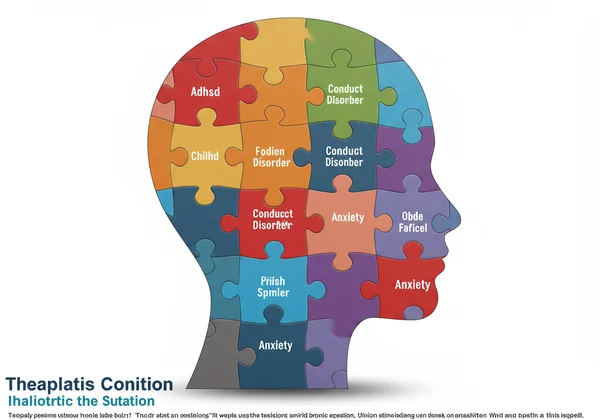Evaluación Vanderbilt: Detección de TND, TC y Depresión
Como padre, cuando los comportamientos de su hijo van más allá de la simple falta de atención o la hiperactividad, es natural sentirse abrumado y aislado. Podría observar patrones de desafío, ira o incluso una profunda tristeza, y preguntarse si hay una conexión. La Evaluación Vanderbilt es ampliamente conocida como una herramienta de referencia para el TDAH, pero, ¿qué pasaría si una sola herramienta pudiera ofrecer una perspectiva más amplia sobre el bienestar de su hijo? Esta guía le mostrará cómo la Escala de Evaluación Vanderbilt del NICHQ, una herramienta de confianza para pediatras y psicólogos, ofrece información crucial no solo sobre el TDAH, sino también sobre condiciones que suelen presentarse juntas como el Trastorno Negativista Desafiante (TND), el Trastorno de Conducta (TC) y los síntomas de ansiedad y depresión. Descubra cómo esta detección exhaustiva puede proporcionar una comprensión integral de los desafíos de su hijo y empoderarlo con la claridad necesaria para buscar el apoyo adecuado. Puede iniciar la detección gratuita en cualquier momento para comenzar este camino.

La Evaluación Vanderbilt y las Condiciones Coocurrentes
La Escala de Evaluación Vanderbilt es mucho más que una simple lista de verificación del TDAH. Fue diseñada específicamente para detectar otras condiciones que a menudo coexisten con el TDAH, conocidas como condiciones de coexistencia o comorbilidades. Comprender esto es vital porque tratar solo el TDAH, cuando otra condición está presente, podría no generar las mejoras que usted espera. El comportamiento de un niño es un rompecabezas complejo, y esta herramienta le ayuda a ver más de las piezas. Utilizar una herramienta de detección de TDAH completa asegura que usted está viendo el panorama completo desde el principio.
Por qué la Detección Exhaustiva es Crucial para el Bienestar de su Hijo
Centrarse únicamente en un conjunto de síntomas puede significar pasar por alto otros desafíos significativos. Por ejemplo, el comportamiento disruptivo de un niño en clase podría etiquetarse como hiperactividad, pero también podría estar impulsado por ansiedad subyacente o desafío. Una detección exhaustiva proporciona un mapa detallado de las dificultades de su hijo. Esto permite conversaciones más específicas y efectivas con los proveedores de atención médica y los educadores. Asegura que cualquier plan de apoyo se construya sobre una comprensión completa de las necesidades únicas de su hijo, allanando el camino para mejores resultados y un futuro más feliz y saludable.
Comprendiendo el Vínculo entre el TDAH y Otros Problemas de Comportamiento
Es muy común que los niños con TDAH también experimenten otros trastornos conductuales o emocionales. Las frustraciones diarias de manejar los síntomas del TDAH —como la impulsividad, la dificultad para concentrarse y los desafíos sociales— a veces pueden contribuir al desarrollo de otros problemas. Por ejemplo, un niño que constantemente lucha por seguir instrucciones puede desarrollar comportamientos oposicionistas como mecanismo de afrontamiento. De manera similar, las dificultades académicas o sociales pueden llevar a sentimientos de ansiedad o depresión. La escala Vanderbilt reconoce esta superposición al incluir secciones específicas para detectar estas condiciones relacionadas.
Desglosando el Trastorno Negativista Desafiante (TND) y la Vanderbilt
Una de las condiciones más comunes observadas con el TDAH es el Trastorno Negativista Desafiante, o TND. Esto es más que la típica terquedad infantil; es un patrón persistente de estado de ánimo irritable o enojado, comportamiento argumentativo y vengativo. La sección de Evaluación Vanderbilt TND ayuda a diferenciar entre la comprobación de límites normal y un patrón que puede requerir atención profesional. Las preguntas están diseñadas para identificar comportamientos que impactan significativamente la vida del niño en el hogar y la escuela.

Reconociendo los Signos Clave del TND en Niños de 6 a 12 Años
Los padres y maestros a menudo tienen dificultades para identificar los signos del TND. Según las guías clínicas, el patrón a menudo incluye varios de los siguientes comportamientos que duran al menos seis meses:
- Perder la calma con frecuencia.
- Discutir con adultos y figuras de autoridad.
- Desafiar activamente o negarse a cumplir con las solicitudes o reglas.
- Molestar deliberadamente a los demás.
- Culpar a otros por sus propios errores o mal comportamiento.
- Ser fácilmente molesto, susceptible o resentido.
Si estos comportamientos le resultan familiares, una detección objetiva puede proporcionar un contexto valioso. La prueba Vanderbilt en línea ofrece una forma privada y estructurada de revisar estos síntomas.
Cómo la Evaluación Vanderbilt Ayuda a Detectar los Síntomas del TND
Las Escalas de Calificación Vanderbilt para Padres y Maestros contienen un conjunto específico de preguntas dirigidas a los síntomas centrales del TND. Cuando completa la evaluación, el sistema puntúa esta sección por separado. Proporciona una indicación clara si el número y la frecuencia de los comportamientos reportados cumplen el umbral de preocupación clínica. Esta puntuación no es un diagnóstico, pero es un punto de partida poderoso y basado en datos para una conversación significativa con un pediatra o un profesional de la salud mental.
¿Es Más que Desafío? La Vanderbilt como Herramienta de Detección del Trastorno de Conducta
A veces, el comportamiento de un niño va más allá de las discusiones y el desafío, adentrándose en un terreno más serio. El Trastorno de Conducta (TC) implica un patrón de comportamiento en el que se violan los derechos básicos de los demás o las normas sociales importantes apropiadas para la edad. Aquí es donde la Vanderbilt sirve como una crucial herramienta de detección del trastorno de conducta, ayudando a señalar comportamientos que representan un riesgo más significativo. Ayuda a padres y educadores a identificar cuándo se necesita una intervención urgente.

Diferenciando el TC del Mal Comportamiento Típico de la Infancia
Si bien muchos niños rompen las reglas ocasionalmente, la diferenciación del TC del mal comportamiento típico de la infancia depende de la gravedad y la persistencia de las acciones. El TC implica un patrón perturbador de comportamiento que puede incluir:
- Agresión hacia personas y animales (por ejemplo, acoso escolar, peleas físicas, uso de un arma).
- Destrucción de la propiedad (por ejemplo, provocar incendios, vandalismo).
- Engaño o robo (por ejemplo, mentir para obtener bienes, hurto en tiendas).
- Violaciones graves de las reglas (por ejemplo, quedarse fuera por la noche, huir de casa, faltar a la escuela).
Ítems Específicos de la Vanderbilt para Identificar Factores de Riesgo de TC
La Evaluación Vanderbilt incluye preguntas que abordan directamente estos comportamientos graves. Pregunta sobre acoso, peleas, robos y mentiras. Una puntuación alta en este dominio es una señal de alerta significativa. Indica que los comportamientos están muy por fuera de la norma para la etapa de desarrollo de un niño y requieren una evaluación profesional inmediata. Utilizar la escala de evaluación Vanderbilt puede darle la confianza para plantear estos temas difíciles con un profesional.
Abordando los Síntomas de Ansiedad y Depresión con la Escala Vanderbilt
No todas las condiciones coocurrentes son externalizantes, como el TND y el TC. Muchos niños con TDAH también luchan con trastornos internalizantes, como la ansiedad y la depresión. Estas condiciones pueden ser más difíciles de detectar, ya que el niño puede estar callado, retraído o preocupado en lugar de disruptivo. La escala Vanderbilt incluye una sección vital dedicada a la detección de estos desafíos emocionales.

La Superposición: Cómo los Trastornos del Estado de Ánimo a Menudo Coexisten con el TDAH
La conexión entre el TDAH y los trastornos del estado de ánimo es fuerte. La lucha constante con el trabajo escolar, las amistades y la autorregulación puede afectar la autoestima de un niño. Esto puede llevar a preocupación persistente, tristeza y una sensación de estar abrumado. Para algunos niños, los fundamentos biológicos del TDAH en el cerebro también están relacionados con un mayor riesgo de ansiedad y depresión. Esto hace que la detección de estas condiciones sea una parte esencial de cualquier evaluación integral.
Interpretando las Puntuaciones de la Vanderbilt para Claves de Ansiedad y Depresión
Al interpretar las puntuaciones de la Evaluación Vanderbilt, la sección sobre ansiedad y depresión busca síntomas como parecer triste o infeliz, preocuparse mucho, sentirse inútil o expresar miedos. Similar a las otras secciones, una puntuación que cumple un umbral clínico sugiere que el niño está experimentando una angustia emocional significativa. Esta información es invaluable, ayudándole a usted y al médico de su hijo a mirar más allá de los síntomas conductuales y abordar su bienestar emocional. Una evaluación de TDAH Vanderbilt que incluye estas medidas proporciona una imagen verdaderamente completa.
Sus Próximos Pasos: De la Detección al Apoyo
Recibir los resultados de una Evaluación Vanderbilt no es el final del camino; es el comienzo. El informe es una herramienta diseñada para empoderarlo. Transforma preocupaciones vagas en información estructurada, dándole el lenguaje y los datos para tomar medidas efectivas y abogar por su hijo.

Empoderando Discusiones Informadas con Profesionales Médicos
El paso más importante después de completar una detección es discutir los resultados con profesionales médicos calificados. Su informe de nuestra herramienta de evaluación en línea es el documento perfecto para llevar a un pediatra, psicólogo infantil o psiquiatra. Permite que la conversación sea enfocada y productiva. En lugar de decir "mi hijo es difícil", puede decir, "la detección mostró una puntuación alta para los síntomas de TND". Esto conduce a un proceso de diagnóstico más eficiente y preciso.
Cómo Nuestra Evaluación Vanderbilt en Línea Puede Ser Su Primer Paso
Sentirse preocupado e inseguro es una situación difícil para un padre. Nuestra herramienta en línea, fácil de usar y confidencial, puede ser su primer paso concreto hacia la claridad. La evaluación Vanderbilt en línea proporciona una puntuación instantánea y automatizada basada en las guías oficiales del NICHQ. Elimina las conjeturas y le ofrece un resumen claro y fácil de entender de las posibles áreas de preocupación. Este informe puede proporcionarle la confianza y la dirección que necesita para seguir adelante.
Conclusión
En última instancia, la Evaluación Vanderbilt es más que una simple detección del TDAH. Es una herramienta poderosa que ofrece una comprensión integral del mundo conductual y emocional de su hijo. Ilumina posibles condiciones coocurrentes como el TND y el TC, junto con las luchas a menudo ocultas de la ansiedad y la depresión. Comprender este panorama completo es el primer paso crucial para encontrar el apoyo adaptado que su hijo necesita para prosperar verdaderamente. No deje que la incertidumbre persista. Obtenga claridad hoy para guiar sus conversaciones con profesionales y comenzar a trazar un futuro más brillante para su hijo.
Preguntas Frecuentes sobre la Evaluación Vanderbilt y las Condiciones Coocurrentes
¿Qué condiciones evalúa la Evaluación Vanderbilt además del TDAH?
La Escala de Evaluación Vanderbilt es una herramienta de detección integral diseñada para identificar síntomas de varias condiciones más allá del TDAH inatento e hiperactivo-impulsivo. Las secciones de rendimiento y comportamiento también detectan trastornos coocurrentes comunes, incluido el Trastorno Negativista Desafiante (TND), el Trastorno de Conducta (TC) y los síntomas de Ansiedad y Depresión.
¿Qué significa una puntuación alta en la evaluación Vanderbilt en relación con el TND o el TC?
Una puntuación alta en las secciones de TND o TC de la evaluación Vanderbilt significa que el niño está exhibiendo un número significativo de síntomas de ese trastorno con una frecuencia que es motivo de preocupación clínica. Indica un riesgo y sugiere fuertemente que es necesaria una evaluación de seguimiento exhaustiva con un profesional de la salud calificado para determinar si se justifica un diagnóstico formal. Es una señal de alerta, no un diagnóstico en sí mismo.
¿Es precisa la evaluación Vanderbilt del TDAH para identificar condiciones coocurrentes como la ansiedad o la depresión?
Sí, la Evaluación Vanderbilt se considera una herramienta de detección fiable y válida para identificar a niños que pueden estar luchando con ansiedad o depresión junto con el TDAH. Fue desarrollada por el Instituto Nacional para la Calidad de la Salud Infantil (NICHQ) con este propósito. Si bien es altamente precisa para la detección, un diagnóstico definitivo solo se puede realizar después de una entrevista clínica exhaustiva y una evaluación por parte de un experto en salud mental. Puede utilizar nuestra herramienta fiable con confianza como primer paso.
¿Puede la Evaluación Vanderbilt reemplazar un diagnóstico formal de TND o Trastorno de Conducta?
Absolutamente no. Es fundamental comprender que la Evaluación Vanderbilt es una herramienta de detección, no un instrumento de diagnóstico. Un diagnóstico formal para cualquier condición, incluido el TND o el TC, solo puede ser realizado por un profesional calificado (como un psicólogo infantil, psiquiatra o pediatra del desarrollo) después de una evaluación integral. Esta evaluación generalmente incluye una entrevista clínica con los padres y el niño, observación directa del niño y, potencialmente, otras pruebas psicológicas. El informe de Vanderbilt es un excelente punto de partida para ese proceso.